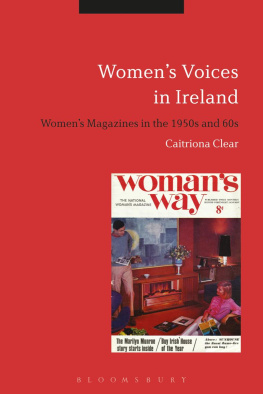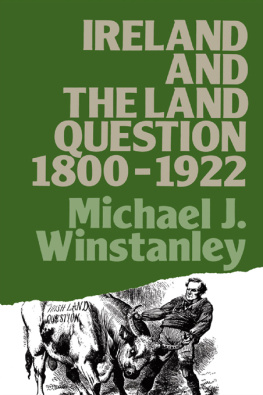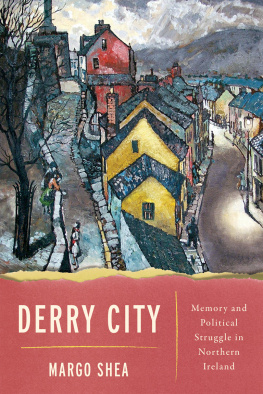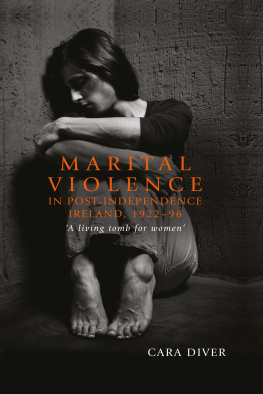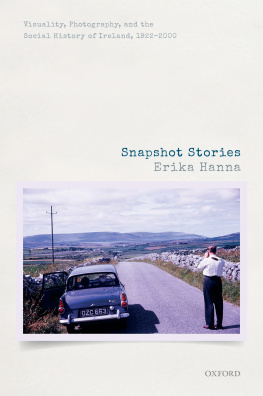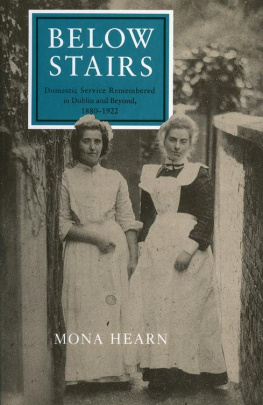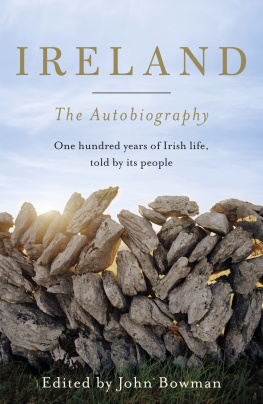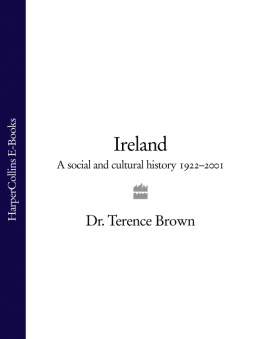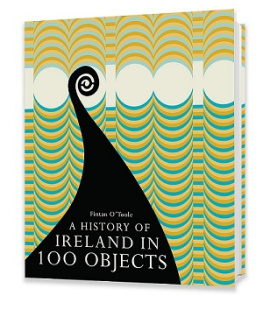Copyright Caitriona Clear 2007
The right of Caitriona Clear to be identified as the author of this
work has been asserted by her in accordance with the Copyright,
Designs and Patents Act 1988.
Published by Manchester University Press
Oxford Road, Manchester M13 9NR, UK
and Room 400, 175 Fifth Avenue, New York,
NY 10010, USA
www.manchesteruniversitypress.co.uk
Distributed exclusively in the USA by
Palgrave, 175 Fifth Avenue, New York,
NY 10010, USA
Distributed exclusively in Canada by
UBC Press, University of British Columbia,
2029 West Mall,
Vancouver, BC, Canada V6T 1Z2
British Library Cataloguing-in-Publication Data
A catalogue record for this book is available
from the British Library
Library of Congress Cataloging-in-Publication
Data applied for
ISBN 978 0 7190 7437 0
First published 2007
16 15 14 13 12 11 10 09 08 07 10 9 8 7 6 5 4 3 2 1
Typeset
by Florence Production Ltd, Stoodleigh, Devon
Printed in Great Britain
by The Cromwell Press Ltd, Trowbridge
Acknowledgements
So many people had a hand in the production of this book that my only difficulty in writing these acknowledgments is finding synonyms for the words thanks and helpful! The comments of undergraduate, postgraduate and diploma students on material I gave them to read over the years often spurred me towards the re-evaluation of some historical truth I had been teaching for some time. Thanks to these most important people, without whom I would not have a job in the first place. Thanks to Professor Steven Ellis and to NUI, Galway for giving me a sabbatical year in 2005, when I put a shape on a very rough manuscript. The biggest thanks is to Pdraig Lenihan: not only did he line, insulate, floor, door, window and wire the garden shed in which I did most of this writing, he also encouraged me all the way. James Hardiman Library, NUI, Galway is a good place to work Marie Boran, Gerry Darcy, Josephine Finn, Evelyn Flanagan, Kieran Hoare, Gaby Honan, Margaret Hughes, Mary OLeary, have my sincere thanks. The library stewards, led by Michael OConnor, were always helpful and pleasant, while college porters John Devaney, Joseph Devaney, Peter Faherty and Matt Reck went way beyond the call of duty in their kindness, courtesy and humour at all times.
I did much of this research over the years in the National Library of Ireland; my thanks go to its wonderful staff. Peter Murray of the Crawford Gallery, Cork, gave me permission for the lovely cover illustration. The National Archives and the old Public Record Office at the Four Courts, and the old State Paper Office in Dublin Castle, have all been great places to do research my thanks to their members of staff too.
On the actual book, Niall O Ciosin read one chapter and made very useful comments. I also either discussed the book (in whole or in part, recently or long ago) with, or received valuable documents, information, insights and encouragement from, the following people, in roughly alphabetical order: Tom Bartlett, Marie Boran, Nicholas Canny, Mary Cawley, Mary Clancy, Kathleen Clear, Paddy Clear, Eileen Clear, Mary Clear (Dublin), the late Sr Gertrude Clear (Boston), Mary Coll, Maura Cronin, Mary Cullen, John Cunningham, Geraldine Curtin, Larry de Clir, Sle de Clir, Mary Daly, Leonore Davidoff, Phil Faherty, Tony Fahey, the late Jenny Finlay, Mire Flannery, John Gibbons, Michael Gorman, Alan Hayes, Sinad Jackson, Sr Conleth Kelly, Claudia Kinmonth, Margaret Larkin, Mary Lawless, Maureen Langan-Egan, Pdraig Lenihan, Grinne Lenihan, Paddy Lenihan, Brd Lenihan, John Logan, Maria Luddy, Marie Mannion, Eithne McCormack, Margaret MacCurtain, Dympna McLoughlin, the late Gearid MacNiocaill, Gerard Moran, Thomas Murtagh, Diarmuid O Cearbhaill, Liam OConnor, Margaret O hOgartaigh, the late Joe OHalloran, Tony OLeary, Ciaran O Murchadha, the late T.P.ONeill, Gearid O Tuathaigh, Lionel Pilkington, Jacinta Prunty, the late Agnes Ryan, Patricia Ryan, Pauline Scully, Ide Sionid, Jim Smith, Penny Summerfield, the late Sr Eileen (Baptist) Synnott, Sr Carmel Synnott, Elizabeth Tilley.
I was very lucky to have inspiring history teachers in the Presentation Convent, Sexton Street, Limerick a Sr Patricia (a visiting Sister of Mercy who taught us in 197273 and whose surname I never learned, a brilliant teacher), Sr Maria Assumpta (who taught Latin but with a great eye for Roman history), Tony Costello and Dave Shee. In the European University Institute in Florence, where I began some of the vagrancy research in 198485: Fiona Hayes, Damian Collins, Richard Dunphy, Vincent Eicher, Norbert Hentz, Eve Lerman, Susanna Terstal, Martin van Gelderen, Henk Voskamp, Stuart Woolf and others were very enlightening, and I derived great benefit from the seminar series at the Institute.
At Manchester University Press Alison Welsby and Jonathan Bevan have been courteous, pleasant and prompt at all times, but the anonymous reader of the manuscript deserves my deepest gratitude for pointing out some embarrassing inaccuracies, curbing some flights of fancy and poking at some flabbiness in the narrative.
Go raibh mle maith agaibh go lir! Mistakes, misinterpretations and misrepresentations are all my own.
And an acknowledgment finally to Donncha, Manus, Cora and Sle Lenihan whose only contact with my history persona are my constant mutterings about when I was their age


